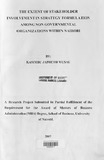| dc.description.abstract | Stakeholders within organizations influence strategy and consequently influence the organization’s purposes that result in formal expectations in terms of achievement. The extents to which organizational stakeholders are interested in or able to influence organizations’ purposes vary and their different power and interests underscore these variations. In the Non-Governmental Organizations (NGO) sector, the values and expectations of different stakeholder groups in organizations play an important part in the development of strategy (Wheelen and Hunger, 1995; Johnson and Scholes, 2002).
It is against this background that this study was designed to determine the extent to which various stakeholders are involved in strategy formulation among Non-Governmental Organizations within Nairobi and establish the factors influencing the extent of involvement of the various stakeholders. The study used primary data which were collected using a semi structured questionnaire with both open and closed ended questions. The questionnaire was administered through mail (drop and pick and e-mail). The study targeted program/project managers from a sample of 100 NGOs drawn randomly from the registered 736 NGOs based in Nairobi.
From the research findings, it was revealed that most NGOs practice strategic planning and that they carry out stakeholder analysis to determine the various stakeholders’ interests which may affect their strategy formulation process. The study established that most NGOs involve their stakeholders in strategy/project/program formulation and that a number of factors influence the extent to which the stakeholders are involved. The results
indicated that stakeholders are given the opportunity to contribute their own ideas during the strategy formulation process; they are allowed to assess and review the ideas during strategy formulation; there is joint decision making with stakeholders during all stages of the project; and stakeholders are given a chance to assess the whole strategy formulation process. It was, however, observed that a considerable proportion of respondent organizations do not involve their stakeholders in strategy formulation to considerable extents.
Further, it was evident from the study that a wide range of factors come into play to influence the extent of stakeholder involvement in strategy formulation. The research findings showed that all factors that were presented to respondents influenced the extent of stakeholder involvement in strategy formulation. The factors range from the important insights offered into project planning to amount of resources in a stakeholder group’s possession, importance of the resource, and availability and expert knowledge of a stakeholder group, up to and including a particular phase of the project life cycle. It was, however, apparent that even though all the factors presented to respondents influence the extent of stakeholder involvement to a great extent, not all organizations indicated this fact, implying that not all factors will have the same influence on the extent of stakeholder involvement in all the organizations.
It was generally concluded that differences in the NGOs’ activities and stakeholder groups’ characteristics have much bearing on the factors that influence the extent of their involvement. | en_US |

